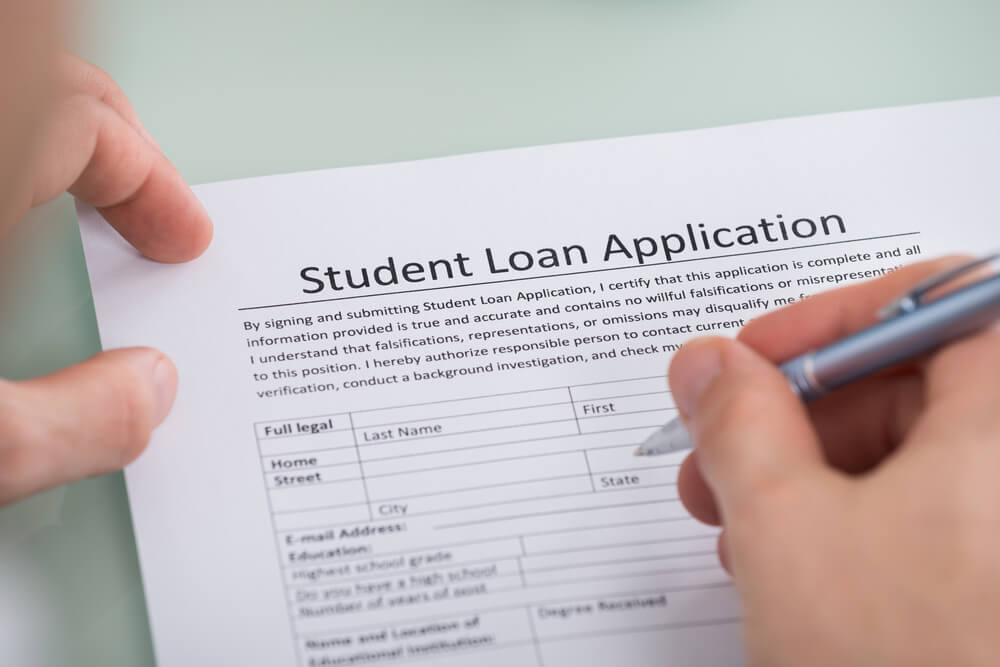Student-centric advice and objective recommendations
Higher education has never been more confusing or expensive. Our goal is to help you navigate the very big decisions related to higher ed with objective information and expert advice. Each piece of content on the site is original, based on extensive research, and reviewed by multiple editors, including a subject matter expert. This ensures that all of our content is up-to-date, useful, accurate, and thorough.
Our reviews and recommendations are based on extensive research, testing, and feedback. We may receive commission from links on our website, but that doesn’t affect our editors’ opinions. Our marketing partners don’t review, approve or endorse our editorial content. It’s accurate to the best of our knowledge when posted. You can find a complete list of our partners here.
How to Apply for Student Loans: Federal and Private
 By
Will Geiger
By
Will Geiger 
Will Geiger is the co-founder of Scholarships360 and has a decade of experience in college admissions and financial aid. He is a former Senior Assistant Director of Admissions at Kenyon College where he personally reviewed 10,000 admissions applications and essays. Will also managed the Kenyon College merit scholarship program and served on the financial aid appeals committee. He has also worked as an Associate Director of College Counseling at a high school in New Haven, Connecticut. Will earned his master’s in education from the University of Pennsylvania and received his undergraduate degree in history from Wake Forest University.
Full BioLearn about our editorial policies

If you are a student paying for college, you will probably come across student loans. There are two main types of student loans that you need to know about: federal student loans and private student loans.
Even within these two categories of student loans, you will encounter different interest rates, terms, and repayment options. On top of this every family’s financial situation is different and some loans may make more (or less sense).
Jump ahead to:
- Federal student loans
- How to apply for federal student loans
- Private student loans
- How to apply for private student loans
- Frequently asked questions about applying for student loans
Keep on reading to learn about how to apply for both federal and private student loans. If you are looking for more information on specific student loans and lenders, check out our list of best student loans.
Start with federal student loans
We recommend that students should start their student loan search by taking out federal student loans. Federal student loans are loans from the government and made directly to students. These loans require no payments as long as the student enrolls in school at least halftime.
These student loans tend to have more favorable interest rates and repayment plans. In fact, some federal loans are “subsidized” which means that the US Department of Education pays your student loan interest when you are in school, a period of deferment, and in a post-graduate grace period.
See also: Subsidized vs. unsubsidized student loans
Federal student loans include the following types of sub-loan types:
- Federal Stafford loans or Direct Stafford Loans, which can be subsidized or unsubsidized. Both types of Stafford loans accrue interest when you are in college, but with Subsidized Stafford Loans, the government pays the interest while you are in school. Learn more about subsidized and unsubsidized Direct Stafford Loans.
- PLUS loans or Parent Loans for Undergraduate students. These PLUS loans can help pay for the cost of attending a college that is not covered by their child’s financial aid package. Parent PLUS loans can range up to the full cost of attendance. It should be noted that these loans are the financial responsibility of the parent, not the student. PLUS loans typically have the highest interest rates among all of the federal student loans available to students. Learn more about Direct PLUS Loans.
- Federal Perkins Loans were subsidized loans with interest rates fixed at 5%. However, these loans were phased out in 2017 when the Federal Perkins Loan program expired and was not renewed by the government.
How to apply for federal student loans
In order to apply for all federal student loans, students must submit the Free Application for Federal Student Aid or FAFSA. One of the biggest misconceptions about the FAFSA is that it is only for need-based financial aid grants. However, students who do not qualify for need-based grants can still be eligible for federal student loans.
Students can apply to the FAFSA starting on October 1st as the FAFSA is based on prior-prior year tax information (so students in the high school class of 2021 would use tax information in the fiscal year in 2019). Note that students who are receiving any aid or student loans from the FAFSA will need to renew the FAFSA application again every year.
Applying for federal student loans is straightforward because the rates are determined by the government each year. We always recommend taking out the minimum number of student loans that you need. You should always take out subsidized loans first and PLUS loans should be a last resort as they typically have higher interest rates.
Private Student Loans
Private student loans, or alternative student loans, are typically the final type of loan families will look at. If you are in a situation where federal/institutional loans and grants are not enough, private student loans are a way to bridge the gap. It is not uncommon for private student loans to have more favorable interest rates than some federal student loans. Either students or parents can take out private student loans.
The downside is that private student loans lack the favorable terms that federal student loans have. For example, when the Department of Education recently suspended student loan payments and interest, only federal student loans were included.
How to apply for private student loans
Unlike federal student loans, you can apply for private student loans at many different types of financial institutions. This means that it is important to shop around to find the best rate of interest. While federal student loans have specific timelines and deadlines, there are no such timelines with private student loans. Instead, students can apply for these loans at any point in time.
Researching private student loans
To research the best private student loan rates we recommend utilizing a private student loan marketplace to search, compare, and apply to the best private student loan for you.
Below you’ll find out more information about these student loan marketplaces including the specific lenders that you can access through each marketplace. Our recommended private student loan marketplaces are:
- Credible – Offers actual rates (not just estimates), customer support 7 days a week, and 3-way phone support connecting you and lenders.
- PrivateStudentLoans.com – The student loan platform founded by Edvisors that also helps educate you on college financing options with articles and a podcast.
- SimpleTuition – The student loan platform founded by LendingTree, America’s largest online lending marketplace.
You can search these marketplaces in only a few minutes to learn about the rates that you qualify for. There is also no credit check when researching student loans through these tools.
This is an extremely important step if you are considering private student loans as it allows you to easily shop around for the best loan terms and rates.
Private Student Loan Applications
Once you select the best student loan option for you, you will need to formally apply for the loan. If possible, apply for private student loans with a cosigner to receive the most favorable rate. Typically, you would chose your parent or guardian as a cosigner. Before you start your application, you and your cosigner (if you’re using one) should have the following materials handy:
- Personal information and contact information
- Social Security Numbers
- Copy of your most recent tax return
- Employment documentation such as a recent paystub
Considering income share agreements
If you have exhausted your federal loan options, it may be worth investigating income share agreements before signing on to private loans. Though they are not as widely available, income share agreements often have more favorable terms for borrowers.
Rather than signing up to repay the amount you borrowed, income share agreements have you agree to pay a certain percentage of your income for a specified number of years after graduation. They also do not require you to make any payments if your income is below a specified threshold. So, you’ll end up taking on less risk and have a more flexible repayment plan.
ISAs are especially beneficial for students without a co-signer or credit history for private loans. They don’t weigh credit scores as heavily, so you’ll have a better chance at approval. That being said, income share agreements are typically only available in fields such as STEM and finance at the moment, as these are the most predictable fields for projected future earnings. You can check whether your school offers them for your program or if any third-party loaners would accept your application.
Don’t miss: How do student loans affect your credit score?
Frequently asked questions about applying for student loans
How much student loan debt is too much?
So, before making any choices, it’s a good idea to find out what income you might expect as a recent graduate of your program, and calculate what your monthly payments would be. Make sure that you’ll have money left over for your necessities and to build towards a healthy financial future. If you cannot guarantee this, you might be taking out too much in debt. In these cases, you can consider more affordable options such as an in-state school or a 4-year college alternative.
Remember, it may be worthwhile to take out more debt if you are pursuing a lucrative degree. But no matter how interested you are in a degree, it probably isn’t worth taking on debt that would consume 50% of your income with monthly loan payments.
Will taking out student loans hurt my credit score?
How do private loan repayment plans differ from federal repayment?
That being said, all borrowers are eligible to investigate consolidation and refinancing for student loans. This can be helpful for anyone who finds themselves in a tight spot in their loan repayment.





